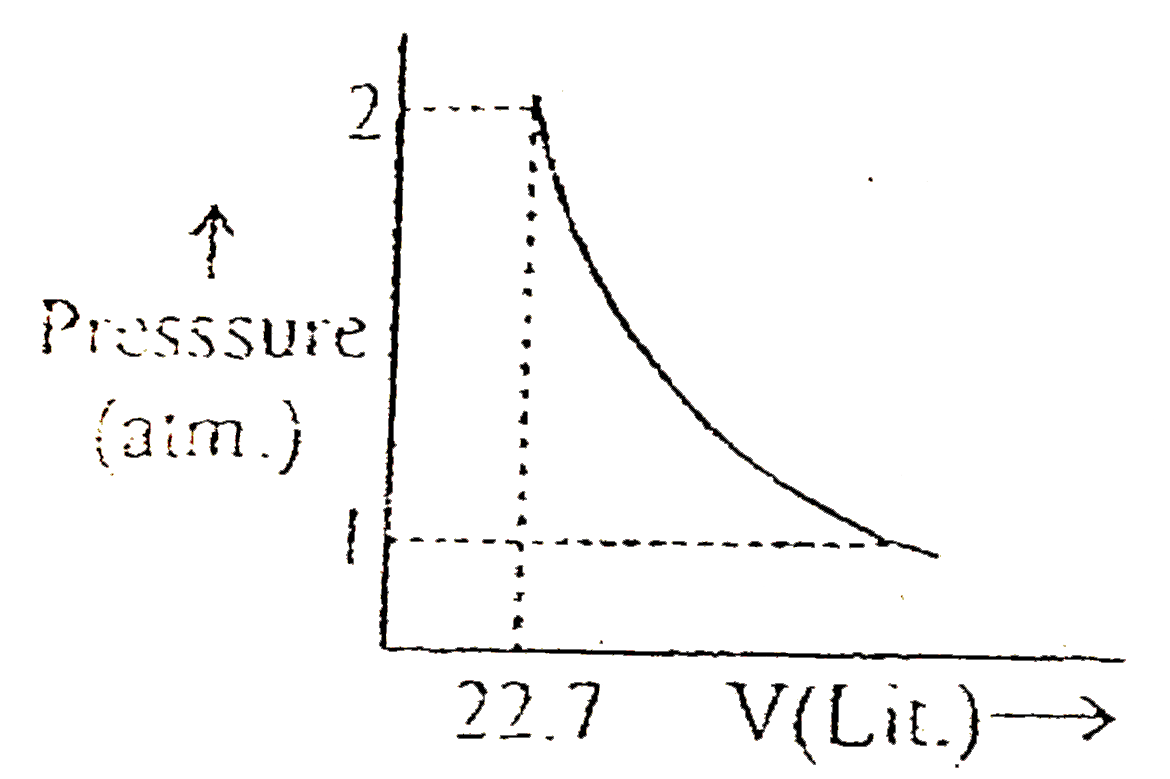2mol of an idela gas expand reversibly and isothermally at 25∘C from 2L to 10L. Calculate the work done by the gas in calories.
To calculate the work done by the gas during its isothermal and reversible expansion, we can follow these steps:
1. Identify the Given Data:
- Number of moles (n) = 2 mol
- Initial volume (V1) = 2 L
- Final volume (V2) = 10 L
- Temperature (T) = 25°C = 25 + 273 = 298 K
2. Use the Formula for Work Done:
The work done (W) during isothermal expansion of an ideal gas is given by the formula:
W=−nRTln(V2V1)
Since we need the answer in calories, we will convert the work done from joules to calories later.
3. Convert the Gas Constant:
The value of the gas constant (R) is:
R=8.314J/(mol K)≈1.987cal/(mol K)
4. Calculate the Work Done:
Substitute the values into the formula:
W=−nRTln(V2V1)
W=−2×1.987cal/(mol K)×298K×ln(102)
W=−2×1.987×298×ln(5)
5. Calculate ln(5):
Using a calculator, we find:
ln(5)≈1.609
6. Substitute ln(5) Back into the Equation:
W=−2×1.987×298×1.609
7. Perform the Calculation:
W≈−2×1.987×298×1.609≈−1918.878cal
8. Final Result:
The work done by the gas during the expansion is approximately:
W≈−1918.878cal
Summary:
The work done by the gas during the isothermal expansion from 2 L to 10 L is approximately -1918.878 calories.
- Number of moles (n) = 2 mol
- Initial volume (V1) = 2 L
- Final volume (V2) = 10 L
- Temperature (T) = 25°C = 25 + 273 = 298 K
The work done (W) during isothermal expansion of an ideal gas is given by the formula:
W=−nRTln(V2V1)
Since we need the answer in calories, we will convert the work done from joules to calories later.
The value of the gas constant (R) is:
R=8.314J/(mol K)≈1.987cal/(mol K)
Substitute the values into the formula:
W=−nRTln(V2V1)
W=−2×1.987cal/(mol K)×298K×ln(102)
W=−2×1.987×298×ln(5)
Using a calculator, we find:
ln(5)≈1.609
W=−2×1.987×298×1.609
W≈−2×1.987×298×1.609≈−1918.878cal
The work done by the gas during the expansion is approximately:
W≈−1918.878cal
The work done by the gas during the isothermal expansion from 2 L to 10 L is approximately -1918.878 calories.
Topper's Solved these Questions
- THERMODYNAMICSBOOK - CENGAGE CHEMISTRY ENGLISHCHAPTER - THERMODYNAMICSEXERCISE - Exercise
1 Videos
- THERMODYNAMICSBOOK - CENGAGE CHEMISTRY ENGLISHCHAPTER - THERMODYNAMICSEXERCISE - Ex 6.1
26 Videos
- STOICHIOMETRYBOOK - CENGAGE CHEMISTRY ENGLISHCHAPTER - STOICHIOMETRYEXERCISE - Archives Subjective
33 Videos
Similar Questions
If 1 mole of an ideal gas expands isothermally at 37∘C from 15 litres to 25 litres, the maximum work obtained is :
View SolutionIf 1 mole of an ideal gas expands isothermally at 37∘C from 15 litres to 25 litres, the maximum work obtained is :
View Solution2 mol of an ideal gas at 27∘C expand isothermally and reversibly
from a volume of 2L to 20L. The work done (in KJ) by the gas is :-
View SolutionCalculate the maximum work obtained when 0.75 mol of an ideal gas expands isothermally and reversible at 27∘C from 10 L to 20 L Also calculate value of q and ΔU accompanying the process.
View Solution5mol of an ideal gas at 27∘C expands isothermally and reversibly from a volume of 6L to 60L. The work done in kJ is
View Solution5mol of an ideal gas at 27∘C expands isothermally and reversibly from a volume of 6L to 60L. The work done in kJ is
View SolutionOne mole of an ideal gas is expanded from a volume of 3L to 5L under a constant pressure of 1 atm. Calculate the work done by the gas.
View SolutionOne mole of an ideal gas expands isothermally from 10 L to 100 L. Change in entropy of the process will be
View SolutionOne mole of an ideal and monoatomic gas is expanded reversibly and isothermally at 298K temperature according to the given diagram, calculate work done.

View SolutionOne mole of an ideal gas is heated at constant pressure from 0∘C to 100∘C.
a. Calculate the work done.
b. If the gas were expanded isothermally and reversibly at 0∘C from 1atm to some othe pressure P, what must be the final pressure if the maixmum work is equal to the work in (a)?
View Solution
